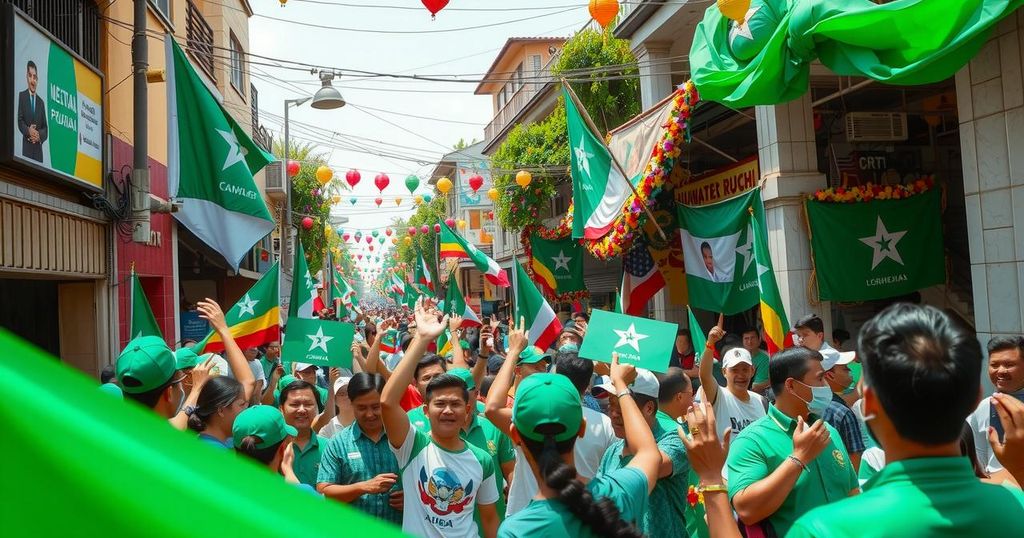Duterte Maintains High Support Amid Controversial Detention and Election
Former Philippine President Rodrigo Duterte remains popular despite his detention at the ICC for alleged crimes against humanity. As elections approach, he appears poised to reclaim the mayor’s seat in Davao City. Supporters remain loyal amidst the political turmoil, with family members actively participating in the ongoing electoral contests.
Davao City, Philippines – In a surprising turn of events, Rodrigo Duterte, the former president of the Philippines, continues to hold significant influence in his hometown while currently serving time at the International Criminal Court (ICC) in The Hague. As he turned 80 on March 28, an outpouring of gifts, particularly flowers and birthday cards, flooded the detention center, showcasing his ongoing popularity despite the looming accusations of crimes against humanity related to his controversial anti-drug campaign.
According to Mr. Nicholas Kaufman, Duterte’s attorney, the ICC was overwhelmed with these tokens of support. “The place was inundated with flowers, and I brought some of the mail out because they didn’t know what to do with it,” he mentioned during a phone interview. As the midterm elections approach on May 12, Duterte’s supporters, wearing his party’s distinctive green, rallied in Davao City, indicating strong backing for his potential return as mayor.
Preliminary election results suggest that Duterte is well on his way to another term, capturing an impressive 63.3 percent of the vote early in the counting process; his closest rival, Karlo Nograles, lagged significantly with 7.8 percent. However, if Duterte is found guilty, he might face life imprisonment, casting a long shadow over his political ambitions.
Duterte’s situation has sharply divided Philippine public opinion. Some polls indicate a majority support the ICC investigation into his actions; conversely, many loyalists perceive him as a victim of political vendetta—accusations some attribute to the current president, Ferdinand Marcos Jr., a former ally of Duterte’s family. Consequently, Marcos’ approval rating dropped from 42 percent to just 25 percent, while his daughter and current vice president, Ms. Sara Duterte, saw her popularity rebound to 59 percent, a crucial development as she contemplates her future political aspirations.
This election also implicates the fate of Sara Duterte, who has been embroiled in serious allegations including corruption and complicity in the drug war killings. With the Senate up for grabs, a decision on her possible impeachment could reshape the power landscape in summer.
In Davao, a notable shift is evident with three political families uniting—Nograleses, Garcias, and Al-ags—to contest against the Dutertes. However, even opponents like Bernie Al-ag, a former vice-mayor, expressed a certain sadness regarding Duterte’s predicament, acknowledging him as a father figure.
Furthermore, Duterte’s allies are leveraging his situation at the ICC to forge a narrative of victimhood. At a recent rally, visuals of his arrest played alongside chants of “BRING HIM HOME.” Sara Duterte criticized the situation, decrying her father’s detainment as an international injustice.
Life for Duterte in The Hague revolves around routine, food complaints—he allegedly prefers rice—and family visits. His daughter noted that his requests for culturally appropriate meals had been met so that he receives rice, along with his beloved Coke Zero—albeit just one can per day. He reportedly engages in a variety of activities including exercise and meeting with legal counsel.
Despite being in a Dutch prison facility, it’s been described, perhaps with a hint of irony, as a comfortable environment. According to Kaufman, “Jokingly, some people refer to it as a five-star Hilton,” yet he remains keenly aware it is still prison.
A legal fight looms, as Kaufman insists there’s no basis for the case against Duterte, arguing the Philippines had withdrawn from the Rome Statute before an inquiry into the drug war commenced. Duterte’s legal team has requested his unconditional release, with a hearing for confirmation of charges slated for September 23. Meanwhile, outside his Davao residence, supporters are steadfast, maintaining their vigil and unwavering belief in his eventual return. “We will never get tired waiting for him,” remarked Janice Mahipus, emphasizing the loyalty of his base in the face of current adversities.
In summary, despite his incarceration at the ICC, Rodrigo Duterte’s influence remains unshaken in the Philippines, particularly in Davao City, where he is set to reclaim his mayoral seat. The forthcoming midterm elections will test the strength of Duterte’s legacy against a backdrop of serious legal challenges and evolving political dynamics. Meanwhile, public sentiments are deeply polarized, revealing a country still grappling with the lasting effects of Duterte’s controversial presidency. As the legal battles unfold, his family continues to play a pivotal role in maintaining support among their loyal constituency.
Original Source: www.straitstimes.com




Post Comment